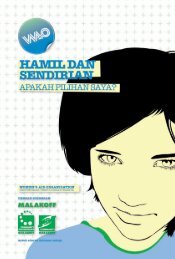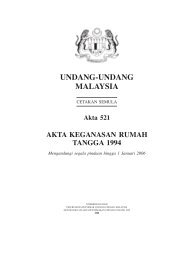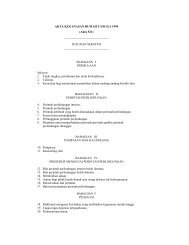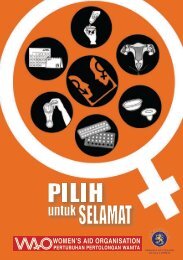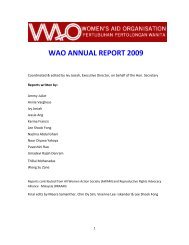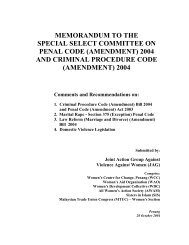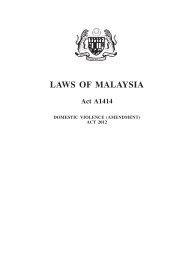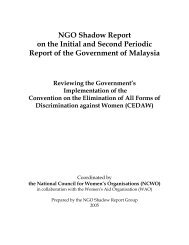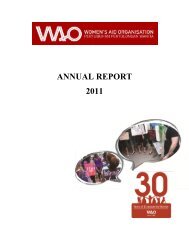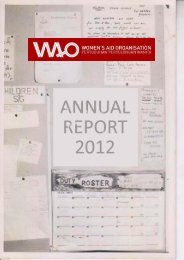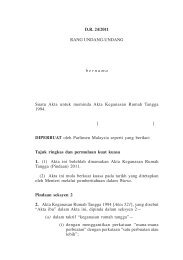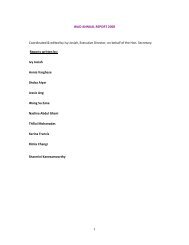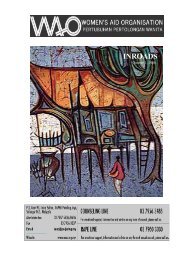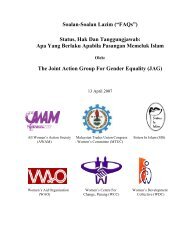2002 - Women's Aid Organisation
2002 - Women's Aid Organisation
2002 - Women's Aid Organisation
You also want an ePaper? Increase the reach of your titles
YUMPU automatically turns print PDFs into web optimized ePapers that Google loves.
1<br />
WAO ANNUAL REPORT <strong>2002</strong><br />
Collated and edited by Ivy Josiah, Executive Director on behalf of the Hon.<br />
Secretary, WAO Executive Committee <strong>2002</strong>/2003<br />
Contributions from Rozana Isa, Annie Varghese, Wathshlah G. Naidu, Jesse<br />
Ang, Lee Shook Fong, Jacyln Kee, Viji Ramanathan, Chong See Mun<br />
WAO Annual Report <strong>2002</strong> IJ 03/03 1
2<br />
1. THE FOLLOWING WERE ELECTED AT THE 19TH ANNUAL GENERAL<br />
MEETING HELD ON 22 nd APRIL <strong>2002</strong> AT 2.30 P.M. BILIK ANGGERIK, APDC,<br />
JALAN DUTA, KUALA LUMPUR<br />
President<br />
Meera Samanther<br />
Vice President<br />
Shanthi Dairiam<br />
Secretary<br />
Mok Chuang Lian<br />
Asst Secretary<br />
Sharon Hariharan<br />
Treasurer<br />
Yeow Ai Lin<br />
Asst Treasurer<br />
Carol Chin<br />
Committee Members Fawzia Hanoum Ariff (resigned 16/8/02)<br />
Committee Member Vivienne Lee Iskandar<br />
Committee Member Sharon Kaur<br />
The EXCO conducted 5 committee meetings in <strong>2002</strong><br />
1.1 WAO COMMITTEES, GROUPS, REPRESENTATIVES<br />
Staff Committee<br />
Meera Samanther<br />
Mok Chong Lian<br />
Yeow Ai Lin<br />
Ivy Josiah<br />
House Group<br />
DVA /JAG committee:<br />
CEDAW Core Committee:<br />
Meera Samanther<br />
Vivienne Lee Iskandar<br />
Fawzia Hanoum Ariff<br />
WAO staff<br />
WAO Social Workers<br />
Lee Shook Fong<br />
Wathshlah G. Naidu<br />
Jaclyn Kee<br />
Meera Samanther<br />
Ivy Josiah<br />
Sharon Kaur<br />
Wathshlah G. Naidu<br />
Ivy Josiah<br />
Rozana Isa<br />
Shanthi Dairiam (IWRAW, AP)<br />
Sexual Harassment / JAG:<br />
chaired by WCC Penang<br />
Wathshlah G. Naidu<br />
Lee Shook Fong<br />
Jacyln Kee<br />
Ivy Josiah<br />
Rape Taskforce:<br />
chaired by AWAM<br />
Jacyln Kee<br />
Lee Shook Fong<br />
WAO Annual Report <strong>2002</strong> IJ 03/03 2
3<br />
Anak Angkat Coordinator:<br />
Volunteer Coordinators:<br />
Jessie Ang<br />
Jaclyn Kee<br />
Annie Varghese<br />
NCWO:<br />
Malaysian <strong>Aid</strong>s Council:<br />
Shanthi Dairiam<br />
Shoba Aiyar<br />
Wathshlah G. Naidu<br />
Lee Shook Fong<br />
Chiam Jet Yin<br />
Julia Yong<br />
Malaysian Coalition for the Prevention of Child Sexual Abuse:<br />
Viji Ramanathan<br />
Jessie Ang<br />
Jacyln Kee<br />
1.2. PATRON<br />
WAO did not have a patron in the year <strong>2002</strong><br />
1. 3. TRUSTEES<br />
The trustees are as follows:<br />
Toh Puan Datin Dr. Aishah Ong<br />
Rashidah Abdullah<br />
Noor Farida Ariffin<br />
Puan Sri Chong Eu Ngoh<br />
1.4 MEMBERSHIP<br />
In <strong>2002</strong> WAO had 74 listed members and approximately 35 active volunteers<br />
1.5 STAFF<br />
Refuge<br />
Subbalakshmi Aiyer<br />
Jessie Ang<br />
Nazlina Abd Ghani<br />
Normah Mohd Noor<br />
Chong See Mun<br />
Child Care Center<br />
Vijayaledchumy Ramanathan<br />
Mary Selina Santhanasamy<br />
Mary Fatima Vasupillay<br />
Engammah Anumiah (Vijaya)<br />
Rinawati Kasrat<br />
Project Contract Staff<br />
Lee Shook Fong<br />
Wathshlah Naidu<br />
Jaclyn Kee<br />
Social Worker<br />
Social Worker<br />
Social Worker<br />
Night Social Worker<br />
Senior Social Worker<br />
Social Worker<br />
Night Supervisor<br />
Child Minder<br />
Child Minder<br />
Legal Reform Officer<br />
Legal Reform Officer<br />
Communications Officer<br />
WAO Annual Report <strong>2002</strong> IJ 03/03 3
4<br />
Executive Staff<br />
Annie Varghese<br />
Rozana Isa<br />
Sharmini Kanesmoorthy<br />
Ivy N.Josiah<br />
Administrator<br />
Projects Manager<br />
Accounts Executive<br />
Executive Director<br />
2.0 WAO SERVICES ( the numbers below may change, TBC)<br />
Refuge<br />
126 women, 118 children<br />
Face to Face Counselling 87 women<br />
Telephone Counselling 1468 calls<br />
Child Care Centre<br />
27 children<br />
Sexual Assault Helpline 44 calls ( September – December <strong>2002</strong>)<br />
.<br />
2.1 REFUGE<br />
In the year <strong>2002</strong>, WAO provided shelter for 126 women and 118 children compared<br />
to 115 women and 107 children in the previous year. Out of the 126 women, 81<br />
women sought shelter because of domestic violence. There were 18 women migrant<br />
workers, ( 15 foreign domestic workers and 3 trafficked women), 10 single mothers,<br />
17 cases involving rape, incest, financial and housing problems.<br />
The three trafficking cases one of them are from Cambodia and two from Indonesia.<br />
These three women jumped out from the window of the apartment flat where they<br />
were lock inside by their captors. One of them broke her leg when she jumped from<br />
the second floor. The other two jumped from the first floor. They are now safe and<br />
back in their countries.<br />
We have two Iraqi women and their children who were detained in Indonesia when<br />
they attempted to go to Australia to join their husbands.. They were sent to<br />
Malaysian’s camp in Sabah and then to the Semenyih’s Camp in Selangor. However<br />
they qualified for refugee status from the Office of UN High Commissioner for<br />
Refugees in KL and allowed out from the camp. The two women and their children<br />
are now on a monthly special pass from Immigration. Both the Iraqi women are<br />
waiting to join their husbands in Australia.<br />
Our workload in the refuge is increasing and ever challenging every year. This year<br />
we have residents from Indonesia, Iraqi, Australia, India, Cambodia and Thailand.<br />
Since we had so many other nationalities staying in the refuge we needed to liase<br />
with Immigration and embassies. Liaising with the immigration officers and police<br />
officers is another very frustrating task for the social workers whenever we deal with<br />
them.<br />
There were 87 women who came for face-to-face counseling and 1468 of telephone<br />
counseling calls for the year 2001. Our work involved:<br />
‣ Face-to-face counseling to outside clients and residents in the refuge.<br />
‣ Assist clients in seeking protection, employment, housing, childcare service,<br />
referral services to government bodies, NGO, private sectors etc.<br />
‣ Regular House meeting with the residents to help residents resolve their<br />
grievances and ensure the smooth running of the refuge.<br />
WAO Annual Report <strong>2002</strong> IJ 03/03 4
5<br />
‣ Weekly social workers’ meetings to enhance a common understanding and better<br />
case management for every client. It also helped us to strategize our social work<br />
plan by sharing our experiences.<br />
Women’s Programme<br />
Women’s support group session as and when the need arise. The issues discussed<br />
include understanding of the legal system (IPO, divorce, child custody and etc),<br />
family planning, defense skill, Yoga, self-discovery, parenting etc.<br />
‣ Enrichment programme, such as English language classes by one of our<br />
dedicated volunteers, computer classes in co-operation with a project called<br />
Mothers For Mothers and sewing classes .<br />
‣ Outings for the residents such as bringing them for movies, parties, and festive<br />
celebrations.<br />
Children’s Programme<br />
‣ Daily activities for the children in the refuge such as coaching them in their<br />
studies, coloring, reading, supervising them in using the computer etc.<br />
‣ Children’s support group sessions by Viji and Nazlina. The issues include<br />
personal safety, anger management, self-exploration, communication skill and so<br />
on.<br />
‣ Outings for the children in co-operation with our Child Care Centre.<br />
It would have been impossible for five social workers to make all the abovementioned<br />
activities happen without the strong support of all the refuge staff and the<br />
staff from the Child Care Centre.<br />
Many of our ex-residents play an active role as resource persons helping the<br />
residents in the refuge in terms of sharing their experiences, finding employment,<br />
housing, childcare and so on. This may show that they were empowered enough<br />
through our helping process to want to help others.<br />
2.3 CHILD CARE CENTRE (CCC)<br />
The CCC received 21 new children belonging to 10 mothers. Between 1990 to <strong>2002</strong><br />
the WAO Child Care Centre had helped 197 children belonging to 92 mothers.<br />
Children at the CCC at the beginning of <strong>2002</strong> 6<br />
Intake of children during the year 21<br />
Children who left during the year 18<br />
Children still at CCC by the end of <strong>2002</strong> 9<br />
Total 27<br />
In <strong>2002</strong>, 27 children belonging to 14 mothers used the CC C’s services.<br />
Of the 27 children who were at the CCC in <strong>2002</strong><br />
kindergarten children 9<br />
primary school 17<br />
secondary school 1<br />
WAO Annual Report <strong>2002</strong> IJ 03/03 5
6<br />
Children who left in <strong>2002</strong> (18)<br />
11 children belonging to 5 mothers, went to live with their mothers.<br />
In these families, mothers were able to take all their<br />
children back.<br />
2 children (of 5 children), belonging to one (1) mother left the<br />
Centre; one stayed with his mother while another stayed<br />
with grandparents. Three siblings of these children<br />
continued to stay at the Centre.<br />
2 children belonging to one (1), mother left to stay with<br />
grandparents.<br />
3 children belonging to 2 mothers went to live in permanent<br />
children’s homes.<br />
Activities for children<br />
As usual, school-going children at the Centre were busy with school and homework.<br />
Staff and volunteers helped coach the children.<br />
There were also ample opportunities for children to discuss their feelings and<br />
thoughts individually, as well as in groups. Group discussions, activities and projects<br />
were especially popular with the children – and turned out to be great ways for them<br />
to learn and interact.<br />
In <strong>2002</strong> however, there were more preschool children, which meant that a lot of<br />
effort went into minding the children. As such, there was more need for separate<br />
activities to run concurrently.<br />
Children, of all age groups, got together when it came to singing, dancing and drama.<br />
There were also fun events and outings, like, swimming and trips to places of<br />
interests, organised and facilitated by volunteers and staff. Children also organised<br />
their own picnics in the garden and the nearby playground.<br />
In addition to regular one- off activities, seven children from the Centre, together with<br />
children from another Children’s Home benefited from a six-month Wetlands<br />
awareness programme , which was organised by Raleigh International. This<br />
programme involved classroom sessions, swimming lessons, and actual visits to the<br />
Wetlands.<br />
One of the children in the Centre also participated in a six-month Teater Muda<br />
Programme, run by five Arts Centre where participating children were introduced to<br />
basic elements of music, movement, drama and visual arts.<br />
We had a few but, good volunteers helping the children through the year. Children<br />
also received many treats and goodies from neighbors and donors.<br />
WAO Annual Report <strong>2002</strong> IJ 03/03 6
7<br />
Mothers<br />
Most mothers were in touch with their children on a regular basis by telephone;<br />
spending their off days and holidays with their children. Mothers either stayed at the<br />
CCC with their children or took them out.<br />
While we noticed that the number of mothers attending mothers’ gatherings went<br />
down, CCC staff were able to keep in touch with mothers during their visits and<br />
phone calls.<br />
Most mothers had problems finding and keeping their jobs. They also had problems<br />
finding suitable accommodation. Women had to move from one accommodation to<br />
another each time she moved jobs, had a difficult landlord, or found a cheaper place<br />
to live in. Most mothers held low paying jobs; financially it was always a struggle for<br />
them.<br />
Children who had left the Centre and their mothers continued to keep in touch.<br />
Mothers would call or come to the Centre, to share their successes, setbacks, their<br />
children, or just to be in touch. Mothers sometimes brought the children for<br />
counselling, or to bring them back to familiar and friendly environment. Most children<br />
who leave miss their friends who they leave behind. Visiting the Centre does give<br />
children the opportunity to meet with their friends, who may still be with the Centre.<br />
This year the staff had to face the realities of children whose education had long<br />
been neglected. Getting children to catch up on what they missed at school was one<br />
of our priorities.<br />
We had children who missed their siblings, as they lived elsewhere. Children had<br />
sisters and brothers, who were either with their mother, their father, relatives, or<br />
another Children’s Home. In these cases, children rarely get to meet their siblings.<br />
The mothers too have to divide their available free time, visiting their children who<br />
are in various locations.<br />
We noticed that children felt and indicated that violence and violent behaviour of their<br />
fathers were wrong, and many children tended to be violent themselves. Many found<br />
violence as a way of communicating their dissatisfaction. There were also the<br />
children who missed their violent fathers. It is always a long and difficult process, for<br />
understanding and change to occur.<br />
Finding suitable permanent Children’s Homes for children whose mothers could not<br />
take the children to live with them, was also a challenge.<br />
Generally the children were well and improved in their studies and all staff and<br />
volunteers will testify that the CCC children are a joy to work and play with.<br />
3. ANAK ANGKAT SPONSORSHIP PROGRAMME<br />
Anak Angkat Programme was set up with the aim to help subsidise the educational<br />
costs (school books, bus fares, uniforms, stationary, pocket money) of the children of<br />
the ex-residents of WAO who have decided to stay on their own.<br />
WAO Annual Report <strong>2002</strong> IJ 03/03 7
8<br />
This sponsorship programme has been a tremendous help for our ex-residents who<br />
have decided to establish an independent life style as single parents to help alleviate<br />
their financial burden. In <strong>2002</strong>, 29 children from 20 mothers were the beneficiaries of<br />
this program by 23 sponsors.<br />
Adelyn Tsai<br />
Anna Maria<br />
Annapoorni<br />
Chic Fashion House<br />
Chong Kuan Lai<br />
Choo Fong Kuan<br />
Datuk Sulaiman Sujak<br />
Dr Fatimah Yakin<br />
Indra Kulasegaran<br />
K. Ganesan<br />
Kathleen Chin<br />
Lee King<br />
Mission Synergy<br />
Puan Sri Jamilah<br />
Ravindran V.<br />
Robert Gan<br />
Shanthi Pragasam<br />
Tony Lau<br />
Tracy Wong<br />
V. Kanesan<br />
Vivien Lee<br />
Wong Loo Min<br />
Zeenath Begum<br />
4. INTERNS AT WAO<br />
<strong>2002</strong>, was another year of both local and foreign interns. We hosted interns who<br />
were students from Malaysia, USA and Finland . Interns came to WAO to learn first<br />
hand about violence against women within the framework of women’s human rights.<br />
As they were learning more about these gender issues they assisted the staff in<br />
various projects. From handling the phones, organising children’s and women<br />
programmes, researching and writing, the interns were invaluable in making our work<br />
at WAO easier and more dynamic.<br />
1. Norizan bt Hassan, HUKM, Malaysia May - June<br />
2. Chua Sook Ning, Taylor’s College, Malaysia April - August<br />
3. Jessika Spangberg, Malmoe University Sweden May - July<br />
4. Nazish Ansari Georgetown University Law Centre, USA June - August<br />
5. Shaline Rao, Harvard, USA June - August<br />
6.Jocelynn Liu,Oxford University, United Kingdom August - September<br />
7. Sari Anne Mari Roppo from Aalborg University, Finland September- Dec.<br />
8. Serene Sim, from UPM. Malaysia December - May 03<br />
5. ADVOCACY<br />
5.1 Monitoring The Domestic Violence Act (DVA)<br />
Monitoring of the DVA was continued by WAO, focusing more on the need for<br />
protection of domestic violence survivors and their children.<br />
i) Monitoring the agencies<br />
Monitoring the police<br />
Following letters that were written to the Ministry of Women and Family Development<br />
regarding attitudes of police officers dealing with domestic violence cases, a meeting<br />
WAO Annual Report <strong>2002</strong> IJ 03/03 8
9<br />
was held in July with the Director General of Women’s Affairs Department, Ministry of<br />
Women and Family Development.<br />
As a result of our social workers’ good rapport with the Petaling Jaya District Police<br />
Headquarters, a meeting was held in September to share the experiences of WAO<br />
with the Investigating Officers from the Sexual Assault Unit. In the meeting, it was<br />
addressed that there was a crucial need to coordinate and streamline the procedures<br />
and management of domestic violence cases between other agencies such as the<br />
Welfare Department and the hospitals. WAO recommended for the Petaling Jaya<br />
District Police Station to play a major role in facilitating a meeting between the<br />
agencies. Following that, another outcome of the meeting was the handing over of<br />
the domestic violence posters (posters from the Department of Welfare) to the 12<br />
police stations under the jurisdiction of Petaling Jaya District.<br />
Monitoring the Welfare<br />
WAO’s advocacy with the welfare produced results when a poster on domestic<br />
violence was designed by the Department of Welfare with input/consultation from<br />
WAO and displayed at welfare departments nationwide.<br />
Monitoring the Courts<br />
WAO project officers and social workers continue to monitor the progress of the court<br />
cases involving domestic violence cases. Besides monitoring the delays in court<br />
hearings, WAO social workers also work closely with the lawyers and public<br />
prosecutors who are representing the domestic workers.<br />
Dialogue with the Chief Registrar of Courts<br />
Following a letter requesting for a meeting to discuss the disparity and nonuniformity<br />
in court procedures relating to the Interim Protection Order (IPO)<br />
for survivors of domestic violence, a dialogue was held on 16 May <strong>2002</strong>.<br />
During the meeting the following areas were covered –<br />
1. Application Process of the Interim Protection Order<br />
- The necessity of the presence or involvement of the Welfare<br />
Department Officer when applying for the IPO<br />
- The availability of the IPO application form<br />
- The inclusion of other persons in the IPO application form<br />
- The jurisdiction of the IPO<br />
- Immediate issuance of the IPO<br />
2. The necessity for the presence of the domestic violence survivor during<br />
renewal of the IPO.<br />
3. Serving the IPO<br />
- serving of the IPO by the victim<br />
- monitoring the servicing of the IPO<br />
- status of the IPO – whether it has been served or otherwise<br />
4. Powers of arrest –<br />
- Violation of the IPO<br />
5. Contents of the IPO – Specific terms in the IPO<br />
6. Proceedings of Domestic Violence Cases<br />
WAO Annual Report <strong>2002</strong> IJ 03/03 9
10<br />
ii)<br />
Law and Policy Implementation Sub Committee<br />
The Law and Policy Implementation Sub Committee of the MWFD National Steering<br />
Committee on Violence Against Women of which WAO is the co – chair, completed<br />
the discussions and a draft memorandum was prepared by the representative from<br />
the Attorney General’s Chamber. The Joint Action Group (JAG) convened, and<br />
redrafted the memorandum in November to include specific items that were left out.<br />
WCC Penang and WAO re wrote and edited the Memorandum which is to be<br />
presented in 2003 to the main committee and MWFD.<br />
iii)<br />
International intervention<br />
WAO both participated and presented a paper at the Asia Regional Workshop on<br />
Strengthening Partnerships for Eliminating Gender–Based Violence which was held<br />
in Kuala Lumpur. It was organised by the Government of Malaysia, the<br />
Commonwealth Secretariat and the United Nations Fund for Women (UNIFEM).<br />
Ivy Josiah presented a paper titled “WAO Refuge : You Can’t Beat a Woman”.<br />
Ivy Josiah also represented WAO at the United Nations Special Rapporteur for<br />
Violence Against Women Consultation in August <strong>2002</strong>. The Consultation, organised<br />
by Asia Pacific Forum on Women, Law and Development was held<br />
in Colombo, Sri Lanka.<br />
5.2 Monitoring the Fulfillment of the Malaysian Government’s Obligation to<br />
Women’s Equality- A CEDAW Baseline Report on Marriage and Divorce<br />
i) Finalising and improving the Baseline Report<br />
The feedback gathered from IWRAW Asia Pacific, identified the need for additional<br />
research and for the baseline report to be rewritten in a narrative format. A<br />
researcher was hired for two months to substantiate and fill the gaps. The researcher<br />
drafted questionnaires, collected data from the Bar Council, carried out specific<br />
qualitative interviews with both Muslim and non-Muslim divorced women in Kuala<br />
Lumpur and Selangor as well as conduct interviews with family lawyers in Kuala<br />
Lumpur. She finally analyzed and tabulated the research data. Any new development<br />
in laws and policies was incorporated in the baseline report. A core committee<br />
meeting was held on 25 July <strong>2002</strong> to finalise and to incorporate the feedback from<br />
the other members. IWRAW AP submitted their final comments and feedback on 7<br />
November <strong>2002</strong>. The baseline report was completed and distributed to participants of<br />
SUHAKAM’s Roundtable Discussion on CEDAW.<br />
Monitoring and Advocacy<br />
Following the meeting with NACIWID in March <strong>2002</strong>, we initiated a meeting with<br />
SUHAKAM (Malaysian Human Rights Commission) on 24 September <strong>2002</strong>. It was<br />
attended by Dato’ Ranita Mohd. Hussein the HR Commissioner with the Malaysian<br />
Human Rights Commission (SUHAKAM) in charge of the Treaties and International<br />
Instruments Working Group and her officer. The Malaysian Human Rights<br />
Commission (SUHAKAM) is aware of the discrimination faced by women in the<br />
country and is keen on working towards equality. They have become our ally in using<br />
CEDAW especially after the successful convening of the dialogue session on 24<br />
September <strong>2002</strong>.<br />
WAO Annual Report <strong>2002</strong> IJ 03/03 10
11<br />
The following issues were agreed upon during the meeting with Dato’ Ranita on 24<br />
September <strong>2002</strong>.<br />
1. SUHAKAM will facilitate a meeting between the government and NGOs,<br />
once the government report to CEDAW committee is complete<br />
2. SUHAKAM will integrate a gender component in its work and policies.<br />
3. WAO will conduct a session on gender orientation for the officers and staff<br />
of SUHAKAM.<br />
The session on Introduction to Gender for Malaysian Human Rights Commission<br />
(SUHAKAM) Officers and Staff was successfully carried out on 25 October <strong>2002</strong>.<br />
WAO was also asked to be part of the committee organizing the SUHAKAM<br />
Roundtable Discussion on CEDAW in conjunction with the International Women’s<br />
Day 2003. The Round Table Discussion on Rights and Obligation Under CEDAW,<br />
held on 17 March 2003, brought together representatives from government agencies<br />
and NGOs. The Chairperson of the Equal Opportunity Commission in Hong Kong,<br />
Ms. Anna Wu was also invited as a guest speaker.<br />
WAO also organised a Workshop on CEDAW for Radiq Radio (Center for<br />
Independent Journalist). Another workshop on gender was held for media<br />
practitioners from 17 – 18 September <strong>2002</strong>.<br />
Shadow Report<br />
The Women’s Development Collective proposed that the Woman’s’ agenda for change<br />
coordinate the Shadow Report. WAO organised meeting in November for the WAC<br />
committee with IWRAW Asia Pacific to know more about the Shadow Report process.<br />
The evening session was beneficial as we learnt more about the objectives of a Shadow<br />
Report to the Government CEDAW Report and the need to monitor and strategize plan<br />
of action to use the concluding comments that will be given by the CEDAW committee to<br />
the Malaysian government.<br />
The WAC committee was also made aware that the NCWO is also planning to<br />
coordinate the Shadow Report among NGOS and we may be duplicating efforts./<br />
No decision was made as to whether the WAC should take the lead to coordinate the<br />
writing of the Shadow Report.<br />
iv)<br />
Promoting CEDAW and the Baseline Report<br />
Advocacy through the media has been encouraging. very opportunity that we get is<br />
made full use of by highlighting CEDAW and its many principles.<br />
We have actively and deliberately named CEDAW and its principles in press<br />
releases, letters to the editors and feature articles in both English and vernacular<br />
papers. WAO has also actively participated in radio and television interviews to<br />
promote the principles of CEDAW.<br />
Work to produce a simple brochure on CEDAW began in <strong>2002</strong>. to be published.<br />
English, Malay, Mandarin and Tamil in 2003.<br />
WAO Annual Report <strong>2002</strong> IJ 03/03 11
12<br />
5.3 Foreign Domestic Workers (FDWs) Abuse<br />
Services- Counseling and Case Management<br />
In year <strong>2002</strong>, 18 women migrant workers sought shelter at WAO. Of the 18 migrant<br />
women, 18 were from Indonesia and one from Cambodia.<br />
15 of them were brought in to Malaysia as foreign domestic workers. The abuse<br />
ranged from poor working conditions, non-payment of wages, physical and<br />
psychological violence including rape. Most of them escaped abuse either by running<br />
away, assistance given by neighbours or rescued by police acting on public reports.<br />
There were 3 migrant women were trafficked for sexual exploitation in Malaysia. Out<br />
of the 3 women trafficked, 2 were from Indonesia and the other from Cambodia. All<br />
three of them escaped their traffickers through jumping off the buildings ( hotels and<br />
apartments) . WAO assisted by contacting their embassies and making<br />
arrangements for their return home. All the three did not want to testify against their<br />
traffickers in court.<br />
WAO has successfully helped some of the FDWs to:-<br />
- Claim for their Unpaid Salary<br />
reclaim their unpaid salary through negotiations with their employment<br />
agency so that the employment agency will get in contact with the employer.<br />
WAO helped 6 of them to claim their salary from their employer through the<br />
recruitment agency.<br />
- Proceed with the Criminal Charges<br />
Provide support to the FDW in the process of charging the perpetrator, giving<br />
statement to the police and testimony in court. WAO has also developed a<br />
protocol to appoint a watching brief lawyer for the FDW to monitor the<br />
proceedings.<br />
At of 31 Dec <strong>2002</strong>, there are 3 FDWs who had their cases pending in court<br />
(Two (2) for rape charges and one (1) for assault).<br />
- Claim for Compensation through a civil suit<br />
Assist in appointing a lawyer to help the FDW file for compensation and<br />
damages through filing a civil suit.<br />
At present there is one case pending in the Klang court.<br />
Of the 15 FDWs, 4 of them returned to Indonesia with an exit memo from<br />
Immigration. 2 of them decided to stay out on their own. Four were sent to the<br />
agency. One was referred to the embassy. As of 31 Dec <strong>2002</strong>, there were 4<br />
FDWs who were still staying in WAO pending their court proceedings.<br />
All 3 of the women who were trafficked returned to their home country<br />
following issuance of one-way pass from their respective agencies and an exit<br />
memo from Immigration. All three of them did not want to testify against their<br />
trafficker whom they only knew by their first name.<br />
.<br />
WAO Annual Report <strong>2002</strong> IJ 03/03 12
13<br />
Advocacy<br />
Aside from providing support to the FDW in claiming for their unpaid/ underpaid<br />
wages, in seeking claims for the abuse suffered, WAO continues to advocate for the<br />
implementation of a standard employment contract for FDWs with the Ministry of<br />
Human Resources and the ratification of the Convention on the rights of migrant<br />
workers and their families.<br />
Networking with NGOs- Local/ Regional/ International<br />
WAO works closely with other women’s organizations to keep them informed of new<br />
cases and developments of FDW issues.<br />
International Advocacy<br />
WAO has worked with the National Commission on Violence Against Women-<br />
Indonesia, the Consortium for Defense of Indonesian Migrant Workers (KOPBUMI),<br />
the Institute of Advocacy on Indonesia Migrant Workers (known as Solidaritas<br />
Perempuan), the Coordination of Action Research on AIDS and Mobility in Asia<br />
(CARAM-Asia), where these organizations have contacted WAO for the following:<br />
- resources and information on the FDW issue<br />
- to seek WAO’s assistance in locating abused FDWs<br />
- to participate and share experiences in workshops/ conferences<br />
Due to our prior contact with the National Commission on Violence Against Women<br />
in Indonesia, WAO was able to assist a representative from this Commission who<br />
was a member of the Indonesian Government delegation to negotiate on the details<br />
on a Memorandum of Understanding between Indonesia and Malaysia. Specifically,<br />
WAO’s position paper on the need of a standard employment contract was a useful<br />
reference for the negotiation.<br />
Media Highlight<br />
The FDW issue was highlighted in the Malay Mail’s fortnightly column on “Know Your<br />
Rights”.<br />
Participation in Conferences/ Consultations<br />
WAO was invited to participate in a few consultations to share our experience in<br />
Malaysia at the national and regional level.<br />
Meera Samanther and Lee Shook Fong participated in the Annual Consultation with<br />
the Special Rapporteur on Human Rights of Migrants (Mrs Gabriela Rodriguez) with<br />
Asian Migrant <strong>Organisation</strong>s & Migrant Support <strong>Organisation</strong>s organized by CARAM-<br />
Asia from 2-3 June <strong>2002</strong> in Kuala Lumpur. The consultation was aimed at developing<br />
a strong and effective reporting and monitoring system on the situation of migrant<br />
rights in Asia, developing a mechanism of working with the Special Rapporteur to<br />
monitor the implementation of obligations of states to protect migrant rights in Asia<br />
and simultaneously strengthen the mandate of the Special Rapporteur to protect and<br />
promote the human rights of migrants in Asia.<br />
Meera Samanther and Ivy Josiah attended the National Consultation on Foreign<br />
Domestic Workers organized by Tenaganita in Kuala Lumpur on 31 July <strong>2002</strong>. Meera<br />
presented a paper titled “Is the Domestic Worker Safe At Home”.<br />
As a follow-up to the national consultation, Meera participated in the Regional<br />
Summit on Foreign Migrant Domestic Workers in Sri Lanka from 26-28 Aug <strong>2002</strong><br />
organized by CARAM-Asia in collaboration with among others Asia Pacific Women in<br />
Law & Development (APWLD), International <strong>Organisation</strong> for Migration (IOM),<br />
WAO Annual Report <strong>2002</strong> IJ 03/03 13
14<br />
Canadian Human Rights Foundation, Office of the High Commissioner for Human<br />
Rights and Indonesian’s National Commission on Violence Against Women<br />
6. PUBLIC EDUCATION<br />
A. CAMPAIGNS/EVENTS<br />
There were seven public education campaigns or events in 2003, some of<br />
which are a combination of public education and fundraising. The campaigns<br />
are:<br />
1. International Women’s Day <strong>2002</strong>: In collaboration with 3R and AWAM, a<br />
full-day event ending with a concert was held at KLCC on 9 th March <strong>2002</strong>.<br />
The thrust of our message was increasing awareness on our work on<br />
domestic violence and foreign domestic worker abuse.<br />
2. Forum on Sexual Assault Management: Co-organised with the British<br />
Council, a dialogue session with two experts from UK on Sexual Assault<br />
Management was held on 12 April <strong>2002</strong>, with participation from press<br />
members and NGOs.<br />
3. Launch of Single Mothers’ Needs Assessment Survey: The survey<br />
was published and launched on 9 May <strong>2002</strong> by YB Datin Faizah of the<br />
Ministry of Women and Family Development, with press members from 10<br />
media organisations (Malay, English and Chinese).<br />
4. Hari Wanita Law Reform Campaign: Annual public education and law<br />
reform campaign with The Bodyshop held on 20 th August, continuing from<br />
2001’s postcard campaign. The thrust was on informing the public of their<br />
right to vote; and to appeal to various Ministries to amend the laws and<br />
policies related to domestic violence.<br />
5. Women’s <strong>Aid</strong> <strong>Organisation</strong> 20 th Anniversary Celebrations: In addition<br />
to celebrating WAO’s 20 th year of work, two additional resources were<br />
launched at 8 September <strong>2002</strong> – the second edition of WAO’s Self Help<br />
Booklet for Domestic Violence Survivors; and WAO’s new extension of<br />
services in the form of a Sexual Assault Helpline. Although the media<br />
publicity for the additional service was consciously tempered due to<br />
concerns of adequate resources, there were 41 calls received from the<br />
line from September <strong>2002</strong> to December <strong>2002</strong>.<br />
6. Press Conference on the Handover of Domestic Violence Posters to<br />
the Police District Headquarters of Petaling Jaya: The two posters<br />
handed over were on domestic violence, and were aimed to increase<br />
public awareness on the issue, as well as to demonstrate the cooperation<br />
which exists between WAO and the particular police station on domestic<br />
violence.<br />
7. 16 Days of Activism Against Gender Violence: Also an annual<br />
campaign held yearly from 25 th November to 10 th December. The theme<br />
for <strong>2002</strong> was “Rock, Soul and Blues: Musical Expression Against Violence<br />
Against Women, conceived in collaboration with Ogilvy. Buskers were at<br />
WAO Annual Report <strong>2002</strong> IJ 03/03 14
15<br />
the Putra & STAR LRT stations throughout the campaign performing to<br />
engage the public on the issue.<br />
B. PRINT MEDIA<br />
WAO was featured in the newspapers and magazines more than 130<br />
times throughout <strong>2002</strong> on news reports, women’s sections, lifestyle<br />
sections, computer sections and feature sections. These included:<br />
1. Comments and Features: highlighting of campaigns, public<br />
education materials, comments on violence against women cases,<br />
hearings of WAO’s clients’ court cases, government<br />
announcements and policies and other current issues.<br />
2. Letters and Statements: notably on International Women’s Day<br />
with the message on violence against women in the workplace –<br />
including sexual harassment and foreign domestic worker abuse;<br />
and with other NGOs on: amendments to the legal and policy<br />
provisions for incest; life imprisonment and public canning for incest<br />
survivors; on the Terengganu Hudud Ordinances; on the mandatory<br />
death penalty for rape of children; on differences of opinion in Islam;<br />
on the judicial decision of the Razali Pilen rape in detention case;<br />
repeal of the Internal Security Act with WAC; and gender<br />
discrimination in parliament with WAC.<br />
3. Know Your Rights: from March <strong>2002</strong>, WAO began a series of<br />
fortnightly articles on the Sunday Mail known as “Know Your<br />
Rights”. It provides basic legal information to women on issues<br />
which may affect them, and starts with a case study from WAO’s<br />
telephone counselling line and face-to-face counselling. From 10 th<br />
March <strong>2002</strong> to 29 th December <strong>2002</strong>, 22 articles were published,<br />
covering topics: sexual harassment; domestic violence; rape and<br />
sexual assault; child sexual abuse and child abuse; divorce,<br />
maintenance and custody for Civil and Muslim cases; foreign<br />
domestic worker abuse; rights as a foreign spouse; registering to<br />
vote; khalwat; division of property; and guardianship and child<br />
registration.<br />
4. Collaterals: public education materials were developed in <strong>2002</strong>,<br />
which serves as additional resource for WAO, including: incest<br />
posters developed with DYR (an advertising firm) and the Ministry<br />
of Women and Family Development; Hapuskan Keganasan<br />
(Domestic Violence) posters developed with the Welfare<br />
Department; Drop the Label series of posters on gender<br />
discrimination in words produced by Novacom; the second edition<br />
of WAO’s Self Help Booklet for Domestic Violence survivors; and<br />
the publication of the Single Mothers’ Needs Assessment Survey.<br />
WAO Annual Report <strong>2002</strong> IJ 03/03 15
16<br />
C) RADIO<br />
WAO was featured at least 26 times on the radio: Radio 4, Radio 6, THR<br />
Raga, BBC World, MIX FM, MY FM, ERA Radio and Nos Radio/Dagblad Trow.<br />
These are for interviews, issue-based programmes and community service<br />
announcements. <strong>2002</strong> also saw the continuation and beginning of regular radio<br />
programmes:<br />
1. Radio 4: Once a month radio programme began in February <strong>2002</strong> until<br />
December <strong>2002</strong>. Topics covered included issues that affect young<br />
women, impact of violence against women as well as empowerment of<br />
women. Language: English<br />
2. Radio 6: Continuing from 2001, 12 radio programmes from January <strong>2002</strong><br />
until September <strong>2002</strong> on various issues affecting women and women’s<br />
rights were developed and aired. Language: Tamil<br />
3. THR Raga: Began as guests in their programmes sporadically on<br />
February <strong>2002</strong> to regular programmes once a month from November<br />
<strong>2002</strong>. Language: Tamil.<br />
D) TELEVISION<br />
WAO appeared on television at least 15 times throughout the year, as guest<br />
speakers on current women’s issues or commenting on news related to women.<br />
WAO has appeared in NTV7, RTM2, TV3, RTM1 and Astro RIA.<br />
E) INTERNET<br />
1. WAO Website: The WAO website continued with regular updates once a<br />
month but for March and May <strong>2002</strong>. Throughout <strong>2002</strong>, there were 42<br />
postings of articles, comments, press statements and announcements of<br />
events. This averaged out to about 3 to 4 postings a month. The number<br />
of hits has been steadily increasing, with a total hit of more than<br />
13,000 visitors form January to December <strong>2002</strong>. August <strong>2002</strong> showed the<br />
highest numbers of visitors (1,746 hits), and on average, there are more<br />
than 1,100 hits on the site, which almost doubled 2001’s 550 hits per<br />
month. This indicates greater interest and reliability of reputation on<br />
WAO’s website as a source of information by the cyber community. The<br />
visitors of WAO’s website are in descending order, from Asia, North-<br />
America, Australia, Europe, Africa, South America and Central America.<br />
However, the geographical location of a large number of our visitors<br />
(59.42%) remains unknown.<br />
2. Collaboration with other web-based radio sites: collaboration with<br />
Radiqradio.com was temporarily halted in October <strong>2002</strong> when Radiqradio<br />
faced difficulties in funding. Collaboration with Asian-Family.com<br />
continued intermittently with WAO as guest speakers.<br />
F. PUBLICATIONS<br />
In <strong>2002</strong>, WAO published the following:<br />
WAO Annual Report <strong>2002</strong> IJ 03/03 16
17<br />
1. Single Mothers – Survivors of Domestic violence, A Needs Assessment Survey<br />
2. A Life Free of violence – a self help guide<br />
3. Kehidupan Bebas dari Keganasan , panduan bantu diri<br />
4. Stop Violence Against Women - the annual body shop brochure.<br />
However, we did not manage to publish the Annual Review 2001 and we aim to do<br />
this in 2003.<br />
7. VOLUNTEER DEVELOPMENT<br />
Jaclyn Kee undertook the task of coordinating volunteers and developing a volunteer<br />
base for WAO. She was assisted by Annie Varghese<br />
• Throughout <strong>2002</strong>, 48 volunteers were orientated in 7 orientation sessions.<br />
This averaged out to about 8 volunteers every two months.<br />
• Some volunteers were active for a period of time, and then stopped for<br />
various reasons including moving out of the country, furthering their<br />
education, finishing their education/course requirements, changing jobs, or<br />
we have simply lost contact. A small proportion of volunteers did not start<br />
volunteering after the orientation because of unmatched expectations. Some<br />
volunteers remained active with us to date (about 20).<br />
• Activities conducted by the volunteers in <strong>2002</strong> included helping out with the<br />
women’s programmes (arts and craft, English lessons, aerobics and dance,<br />
etc.), helping out at the Child Care Centre (tuition and activities), a jumble<br />
sale (October <strong>2002</strong>), producing WAO’s newsletter (December <strong>2002</strong>),<br />
providing transports for activities. Volunteers were exceptionally supportive<br />
during public education and fundraising campaigns. Coordination of activities<br />
was mainly through the e-group wao_volunteers@yahoogroups.com, and has<br />
thus far proved effective.<br />
• A core group of volunteers (15 volunteers) has also committed to supporting<br />
the Sexual Assault Helpline, with training expecting to begin in 2003. A new<br />
e-group was formed (for reasons of confidentiality) for this purpose at<br />
wao_sah@yahoogroups.com.<br />
• A WAO intern, Shaline Rao, produced a Volunteer Training Manual Draft in<br />
July <strong>2002</strong>.<br />
8. FUND RAISING ACTIVITIES<br />
WAO annual expenses stands at approximately RM 753, 000 and through public,<br />
project and government funding we managed to raise RM 714, 113 00, 000 in <strong>2002</strong>.<br />
9.2 % of our total funds collected come from the government , i.e the Welfare<br />
Department and the MWFD.<br />
DAY DATE EVENT<br />
January<br />
Wed 9 Levi Strauss Donation box collection<br />
RM 1,564.33<br />
WAO Annual Report <strong>2002</strong> IJ 03/03 17
18<br />
Sun 27 Independent Practioners’ Healthcare Symposium<br />
RM 7,000.00<br />
February<br />
Thu 28 Malaysian Open Golf Tournament Canon / WAO<br />
RM 700.00<br />
March<br />
Saturday 9 International Women’s Day<br />
Kimberley Clarke Trading – RM 5,000.00<br />
IWD Treasure Hunt – RM 2,840.00<br />
The Body Shop IWD Donation box collection - RM 2,110.72<br />
Mon 18 S.M.K. Assunta Women’s Rights are Human Rights<br />
collection<br />
RM 1,000.00<br />
May<br />
Wed 8 Bulgari Private Sale<br />
Proceeds from Sale – RM 17,500.00<br />
Personal Donation – RM 2,000.00<br />
Donation box collection – RM 1,070.00<br />
Fri 17 Bhaavam (an evening of Indian Carnatic Music &<br />
Bharata<br />
Natyam)<br />
RM 2,000.00<br />
June<br />
Thu 13 Take Off With Us – Karen Barnes Performing Arts<br />
RM 5,000.00<br />
Wed 19 Christie’s Art Lecture & Dinner<br />
RM 20,000.00<br />
August<br />
Tue 13 The Edge KL Rat Race<br />
RM 102,300.00<br />
October<br />
Fri 25-26 LIT Singers performance (Riscon Sdn Bhd)<br />
RM 2, 500<br />
Sun 27 WAO Jumble Sale at Mont Kiara<br />
RM 1,120.00<br />
Wed 30 AD Classic <strong>2002</strong><br />
RM 6,000.00<br />
December<br />
Wed 18 Chain Reaction<br />
RM 31,236.9 – gross sales<br />
WAO Annual Report <strong>2002</strong> IJ 03/03 18
19<br />
Ongoing activities throughout the year<br />
1. Body Shop Candles of Conscience began in August 2001,<br />
RM 10,887.00 (total received in <strong>2002</strong>)<br />
2. Sale of WAO merchandise<br />
.<br />
10. WAO’s 20 th Anniversary Celebration<br />
WAO’s 20 th Anniversary Celebration was held on 8 th September <strong>2002</strong> at Shah’s<br />
Village Hotel and was attended by more than 150 people that comprised WAO<br />
Refuge residents, ex-residents and their children, the Child Care Centre children,<br />
members and volunteers including pioneer members and members of the Protem<br />
committee to form WAO, staff and interns, members from other supporting NGOs<br />
and members of the media.<br />
The programme for the day began with a welcome speech from Meera Samanther,<br />
President of WAO. Following that, Ivy Josiah, Executive Director of WAO, led the<br />
participants through a journey of WAO, from her inception, her growth throughout the<br />
years and her position in the present day, acknowledging groups and individuals who<br />
were involved. Bringing life to the journey, WAO was thrilled to have Puan Sri E. N.<br />
Chong, who was a member of the Protem committee, say a few words and she<br />
shared with us her experiences in forming the Protem committee and setting up<br />
WAO as Malaysia’s first shelter for battered women.<br />
Chee Siew Yoke then spoke of her experience in the drafting of the Domestic<br />
Violence Bill and the barriers and frustrations the drafters faced with the issue of<br />
passing the Bill due to issues pertaining religion. She also spoke of the difference<br />
that she had experienced on how the Act had affected men and their attitudes<br />
towards domestic violence.<br />
Shanthi Dairiam and Dulcie Abraham shared with the participants of how their<br />
involvement with WAO as volunteers became part of their personal progression<br />
towards their views and decisions in life, including personal and career choices and<br />
how it gave them an understanding on the issue of violence against women, how<br />
society condones abuse of women and how religion is sometimes used to endorse<br />
the subordination and abuse of women. Dulcie also paid tribute to WAO and her own<br />
progression from just a shelter for battered women to a centre of advocacy and part<br />
of the conscience of the nation in issues that are both domestic and international.<br />
Ending Ivy’s narration was a digital presentation, Looking Back Looking Forward, of<br />
the herstory of WAO, from how it all began as a rented refuge with 2 social workers<br />
to 2 WAO-owned centres with a staff of 16 strong. The presentation also covered the<br />
expansion of WAO’s focus from predominantly domestic violence to a range of other<br />
issues of violence against women, women’s human rights and rights of women as<br />
Malaysian citizens.<br />
After the speeches, acknowledgements were given to several groups and individuals<br />
who have supported WAO for the last 20 years and recognition was also given to<br />
Mary Selina, who joined WAO on 1 st August 1992 and Kak Normah who joined WAO<br />
WAO Annual Report <strong>2002</strong> IJ 03/03 19
20<br />
on 1 November 1992 as they are both the longest serving staff, having been with<br />
WAO for 10 years.<br />
WAO Self-Help Booklet<br />
15 years ago, WAO produced a simple Self-Help Booklet, which was targeted at<br />
giving women information about what to do in a domestic violence situation, helplines<br />
and myths and facts about domestic violence. With the implementation of the<br />
Domestic Violence Act 1994, WAO then launched the second Self-Help Booklet,<br />
which took into account of the developments since the DVA 1994. The project was<br />
funded by the Ministry of National Unity and Social Development. WAO’s residents<br />
and ex-residents participated in the launch with an ex-resident sharing briefly with the<br />
participants of her experience in getting shelter and protection and building back her<br />
life.<br />
WAO Sexual Assault Helpline<br />
When WAO first opened its doors and telephone lines we received only 18 calls in<br />
1982. However, as the public became more aware of our services through several<br />
public education efforts, we now receive over 1000 counselling calls and provide<br />
shelter to over 100 women per year. WAO in its 20 th year not only continues to<br />
provide shelter, telephone and face-to-face counseling to women and children, she<br />
has also extended her services to include another helpline with the support from<br />
other NGOs and women’s groups and that is the WAO Sexual Assault Helpline.<br />
In 2001 and <strong>2002</strong>, there was a high incidence of reported cases in the media on rape<br />
and incest. Due to this, WAO was prompted to question the state and care of the<br />
survivors of rape and incest, whether they had any access to any services such as<br />
shelter and counselling. WAO was also concerned about the number of cases that<br />
goes unreported and wanted to address the lack of space and support for the<br />
survivors who have not come forward.<br />
Although the main purpose of this line is to provide the much needed space and<br />
support for survivors of rape, incest and sexual assault to come forward and talk<br />
about their ordeal without fear of being judged, prejudiced and misunderstood, it is<br />
also to facilitate the process of healing and to provide critical information on getting<br />
immediate medical attention and how to report to the police, if needs be.<br />
The WAO Sexual Assault Helpline is regarded as an enhancement to WAO’s current<br />
services as WAO is growing to reach out to women in other violent situations. The<br />
launch of the helpline included participation from other NGOs and WAO interns.<br />
The launches were then followed by lunch. Soon after the women and children let<br />
their hair down and participated in games, lucky draws and dances. The day ended<br />
with camaraderie and bonding of women who all gave to WAO reasons to mark the<br />
20 years and celebrate being women.<br />
WAO Annual Report <strong>2002</strong> IJ 03/03 20



